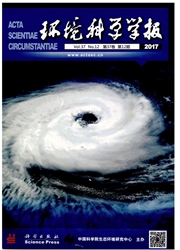

 中文摘要:
中文摘要:
2009年在太湖蓝藻水华形成初期(五月)、盛发期(九月)和衰亡期(十月和十一月),运用基于颗粒态酯酶,溶解性酯酶以及酯酶衰变常数测定的酯酶活性方法对不同湖区(藻型和草型湖区)蓝藻的细胞裂解速率进行了计算,在测定颗粒态酯酶、溶解性酯酶活性时,同步分析了太湖优势种群中蓝藻叶绿素a的含量.统计分析结果表明,叶绿素a的浓度与颗粒态酯酶、溶解性酯酶活性有很好的相关性,说明以酯酶活性为指标来计算太湖蓝藻细胞裂解速率是可行的.对不同湖区的细胞裂解速率进行比较,可见湖心和西太湖在蓝藻水华形成初期细胞裂解速率分别为0.072,0.048d^-1.水华盛发期以及水华衰亡期,湖心和西太湖的细胞裂解速率分别为0.074~0.770d^-1,0.014~0.110d^-1.太湖湖心磷酸盐浓度比西太湖低,所以蓝藻生长速率慢,导致细胞裂解速率比西太湖高.但是,在梅梁湾和贡湖,衰亡末期磷酸盐浓度比其它月份高,细胞裂解速率也高.4个采样点在衰亡末期的细胞裂解速率比水华形成初期,暴发期和衰亡初期要高,可能的原因是气温和水体温度下降导致蓝藻生长速度减慢.本研究结果表明,太湖蓝藻细胞裂解速率有明显的空间差异,其具体的影响因素很多,营养盐只是其中一个.
 英文摘要:
英文摘要:
Lysis rates of cyanobacteria cells in different ecological zones in Lake Taihu were determined by measuring the activities of particle-associated and dissolved esterase and the decay rate of the latter in the initial stage of a cyanobacteria bloom(May),serious phase(September),decline phase(October and November)in 2009.The Chlorophyll a(Chl a)concentration was analyzed simultaneously.The statistical results showed significant correlations between Chl a and particle-associated esterase activity(PEA)and dissolved esterase activity(DEA),indicating it was feasible to apply the esterase assay to calculate the lysis rate of cyanobacteria cells in Lake Taihu.The lysis rates of the cyanobacteria in the lake center and in western Lake Taihu were 0.072 d^-1 and 0.048 d^-1 in the initial stage of the cyanobacteria bloom.From September(serious phase)to November(decline phase),measured lysis rates in lake center were more rapid than in western Lake Taihu,roughly corresponding to the relatively lower phosphate levels in the lake center.The cyanobacteria cell lysis rate in the lake center and western Lake Taihu ranged from 0.074 to 0.770 d^-1 and 0.014 to 0.110 d^-1,respectively.Conversely,in Meiliang Bay and Gonghu Bay,the high lysis rate was observed when phosphate concentration was high in the end phase of the decline.The higher cell lysis rates of cyanobacteria were presumably the result of a water temperature that was relatively low in the terminal stage of decline.The results suggested that the cell lysis rates vary spatially in different ecological zones and it is concluded that nutrient level is one of the factors that affect the cell lysis rates of cyanobacteria.
 同期刊论文项目
同期刊论文项目
 同项目期刊论文
同项目期刊论文
 Horizontal distribution and transport processes of bloom-forming Microcystis in a large shallow lake
Horizontal distribution and transport processes of bloom-forming Microcystis in a large shallow lake 期刊信息
期刊信息
